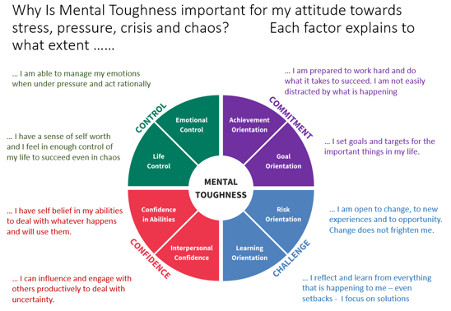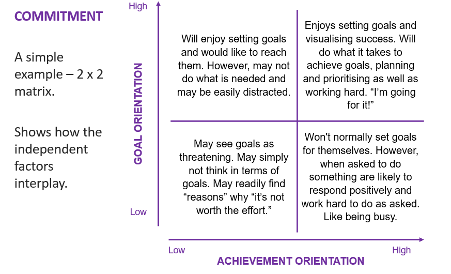Social Media is plagued with posts that promise “X tips to grow your Mental Toughness” or “Y ways to become resilient”. Apart from the fact that many of these so-called tips are huge over-simplifications, there seems to be an assumption that being Mentally Tough or Resilient is the “panacea to solve all ills”.
It is the case that for many, being Resilient or Mentally Tough conveys an advantage at times of stress, pressure opportunity and challenge. It is a useful quality to possess …. but not always!
And there’s the rub. Mental Toughness (and Mental Sensitivity too) brings advantage to those who are self-aware about their level of Mental Toughness.
Mental Toughness describes a spectrum, from Mental Toughness at one end to Mental Sensitivity at the other. What Mental Toughness describes is a fundamental aspect of our personality which explains, in large part, our mental responses to events characterised as stressors, pressure, opportunity and challenge. Our mental responses determine to a significant extent our behavioural responses.
How we think influences how we act – enabling us to understand better why we act the way we do when things happen to us or around us.
The more we understand why we do, the better we can do something about it. Self-awareness is everything here.
It is possible to be Mentally Sensitive, feeling every bump on the journey through life, and yet with self-awareness, you can understand why that is and develop strategies to minimise the downsides associated with Mental Sensitivity and optimise the upsides (and there are many!). The Mentally Sensitive individual can be as effective as the next person.
Similarly, it is possible to be Mentally Tough (developing every one of those “tips”) and fail to achieve. Again, a lack of self-awareness is the key.
Strong sense of “can do” – you can try to do too much. Highly committed – you can work too hard in pursuit of too many goals – burn-out beckons. See the positives in everything – “rose-tinted” glasses spring to mind. Confidence in your abilities – you can easily be overconfident. Self-awareness is everything here.
It is perfectly possible to be Mentally Tough or resilient and still struggle.
There’s a bit of complexity to consider too. Research shows that Mental Toughness isn’t a single thing. It is a blend of 8 factors which revolve around 4 elements called constructs. These are illustrated below.
This is surprisingly important. People aren’t simple, they are complex. Life isn’t straightforward, it is complex (even VUCA). The solutions for almost all of us have to deal with that complexity. There few simple solutions.
The reality is that we can be Mentally tough or Mentally sensitive on each and any of these factors. Few are Mentally tough or Mentally sensitive across all the factors. This means that we each have a distinct pattern to our Mental Toughness. It is reckoned that there are around 40,000 possible combinations of these patterns.
The 4Cs, 8-factor Mental Toughness concept describes much of this complexity and, hopefully, presents it in a way that practitioners and their clients can manage this complexity.
There is a solution(s) for everyone but it isn’t the same or everyone and doesn’t come off a “one size fits all” checklist.
To be fully effective, to be the best version of ourselves that we can be, means that we need to be self-aware about this too. Which aspects of my Mental responses are the ones which lead to life being difficult for me?
If I can understand that, I can find a solution that works for me!

This explains why programmes which are directed at the average or typical person will often miss their mark.
We can add to the complexity. The factors will often combine to produce another level of uniqueness to this aspect of our personality. Levels of achievement orientation and goal orientation can combine in a wide variety of ways within the construct.
A simple illustration is shown below:

And this interplay between factors continues across the whole of the 8-factor framework.
So … not only is self-awareness essential, it is important to have self-awareness about the elements of Mental Toughness.
How can this be achieved?
It is difficult for even the most experienced coach or psychologist to assess this reliably. We can observe behaviour. We can describe our emotions. The way we think lies in our heads and we cannot observe these and can rarely separate the reasons for the way we think. Our thoughts are not visible in the way that behaviour and emotions can be.
It is for this reason that the Mental Toughness psychometric measures based on the 8-factor framework, have been developed. These help the user to create understanding about an individual’s Mental Toughness in all of its aspects. Making “the invisible, visible”, this supports the development of self-awareness.
In the end, being shown “X ways to develop your Mental Toughness” is of limited use. It might even betray that the writer doesn’t understand what it is they are offering.
Indeed, many of those “tips” work best for …… those who already are more mentally tough! To stop thinking negatively means little to someone who cannot understand why someone should think positively when life is so difficult and challenging.
Mental Toughness can have its advantages but it isn’t the goal for most people. For most there are more important goals – achieving more, being more content, enjoying wellbeing and being able to deal with life’s “ups and downs” and so on.
Mental Toughness is an enabler. It’s a very important aspect of our personality which enables us to adopt appropriate mental responses to whatever life throws at us.
At the risk of being repetitive, it requires understanding and self-awareness… not a quick fix set of handy hints.
Doug Strycharczyk
Peter Clough

